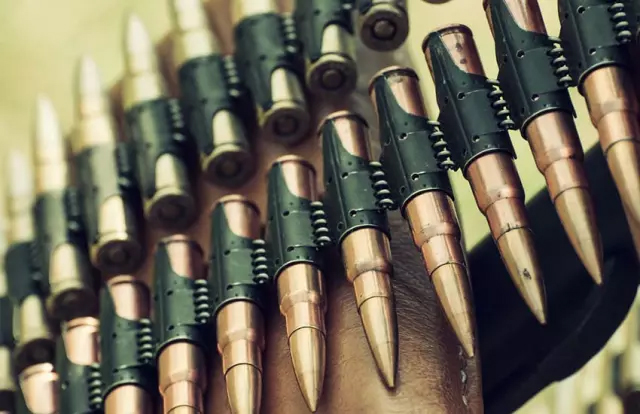In its lawsuit, the government estimated that 2.2 percent of almost 40 million guns manufactured annually in the United States are smuggled into Mexico
October 3, 2022 – The federal government has announced it will appeal the dismissal of its lawsuit against United States gun manufacturers.
The government filed a US $10 billion lawsuit against gunmakers, including Smith & Wesson and Barrett Firearms in August 2021, accusing them of negligent business practices that have led to illegal arms trafficking and deaths in Mexico, where U.S.-sourced firearms are used in a majority of high-impact crimes.
In a claim filed in Massachusetts, it alleged that the companies have undermined Mexican gun laws by designing, marketing and selling high-powered weapons that appeal to criminal organizations in Mexico.
Chief Judge F. Dennis Saylor dismissed the claim in federal court in Boston on Friday, saying that U.S. law “unequivocally” prohibits lawsuits that seek to hold gun manufacturers responsible when people use their products for their intended purpose.
The judge said there were some narrow exceptions in U.S. law but none applied in Mexico’s case against the gunmakers.
Saylor explained that Mexico’s case couldn’t surmount a provision in the Protection of Lawful Commerce in Arms Act (PLCAA) that protects gun manufacturers from lawsuits over “the harm solely caused by the criminal or unlawful misuse of firearm products … by others when the product functioned as designed and intended.”
In a 44-page ruling, the judge wrote that “while the court has considerable sympathy for the people of Mexico, and none whatsoever for those who traffic guns to Mexican criminal organizations, it is duty-bound to follow the law.”
The Ministry of Foreign Affairs (SRE), which filed the suit, said that the government would challenge the ruling.
“The government of Mexico will appeal the decision of the federal judge and continue insisting that the weapons trade must be responsible, transparent and with accountability,” it said in a statement.
The SRE also said the government would continue to argue that “the negligent way in which … [firearms] are sold in the United States facilitates criminals’ access to them.”
The ministry said that the filing of the lawsuit was an “unprecedented and brave action of the Mexican government to prevent firearms, many of which are high-powered, causing violence in our country.”
It also said that its lawsuit has received “worldwide recognition and has been considered a watershed in the discussion about the gun industry’s responsibility for the violence in Mexico and the region.”
Lawrence Keane, the general counsel of the National Shooting Sports Foundation, a U.S. trade association for the firearms industry, approved of the dismissal of the “baseless” lawsuit.
“The crime that is devastating the people of Mexico is not the fault of members of the firearm industry, that under U.S. law, can only sell their lawful products to Americans exercising their Second Amendment rights after passing a background check,” Keane said.
However, the SRE said it’s not giving up on the suit.
“… The government of Mexico will continue taking action to end the illegal trafficking of weapons. The civil lawsuit for damages against those who profit from the violence that Mexicans suffer moves to a second stage,” it said.
In an interview with news magazine Proceso, Foreign Affairs Minister Marcelo Ebrard said that the government knew from the outset that the dismissal of its case was a possibility.
“The judge’s argument is that the PLCAA law, which took effect in 2005, provides immunity to the firearms industry in the United States with respect to civil lawsuits … but he recognizes the impact of the negligence of the firearms industry in our territory,” he said.
Ebrard said that the government didn’t agree with Saylor’s extension of immunity beyond U.S. borders.
“… What we’re saying is that the damage occurs outside the United States and therefore PLCAA doesn’t apply. We will appeal saying that outside the territory of the United States that law doesn’t apply,” Ebrard said.
The judge “is interpreting the law in favor of the firearms industry saying, ‘it isn’t responsible [for people’s actions with their weapons] anywhere, not in the United States or outside the United States,’ but that’s his interpretation, not that of the [U.S.] Congress,” he said.
Ebrard said that Mexico’s appeal will be filed soon and that the government would “look for all the precedents” in U.S. law to support its case. “We think we have a good case,” the foreign minister added.
In its lawsuit, the government estimated that 2.2 percent of almost 40 million guns manufactured annually in the United States are smuggled into Mexico. As many as 597,000 firearms that flow into Mexico each year are believed to be made by the defendants, among whom were also Colt’s Manufacturing Company and Glock Inc.
In addition to the violence generated by the use of U.S.-sourced guns, the SRE argued that the trafficking of weapons has harmed Mexico in other related ways. Among those cited were a decline in investment and economic activity here and the requirement to spend more on public security measures.
Mexico also alleged that U.S. gun companies are aware that their business practices caused illegal arms trafficking in Mexico.
Colt’s, for example, manufactured a pistol embellished with an image of Emiliano Zapata, a hero of the Mexican revolution. That weapon was used in the 2017 murder of Chihuahua-based journalist Miroslava Breach.
The government argued that other arms manufacturers also design weapons to appeal to criminal organizations in Mexico, among which are drug cartels such as the Sinaloa Cartel and the Jalisco New Generation Cartel.



